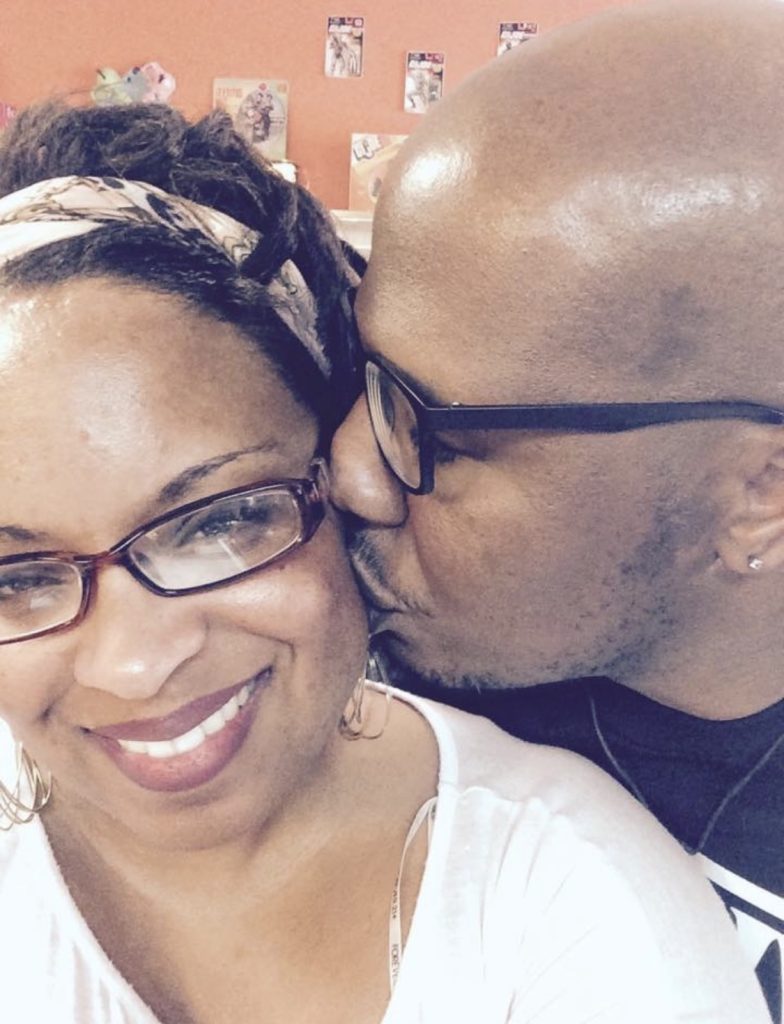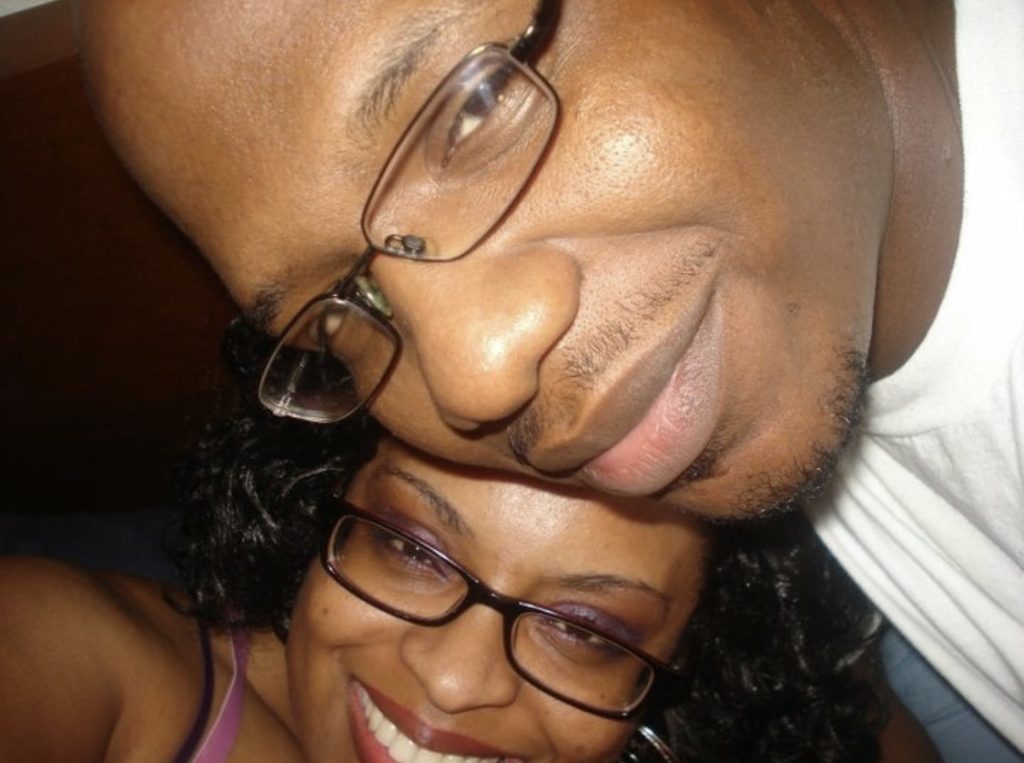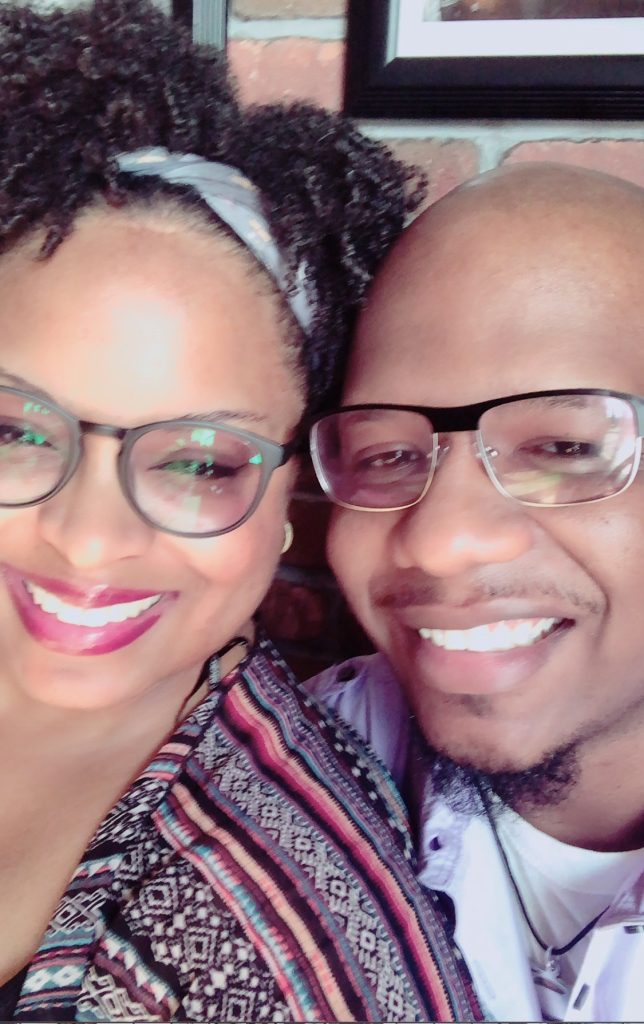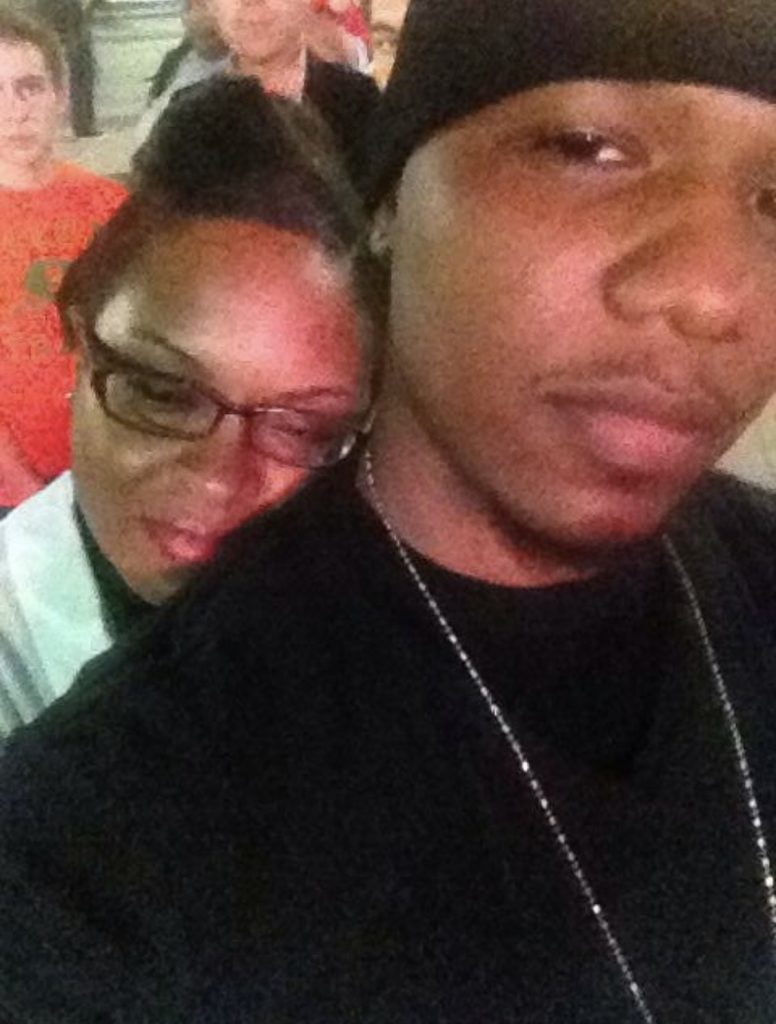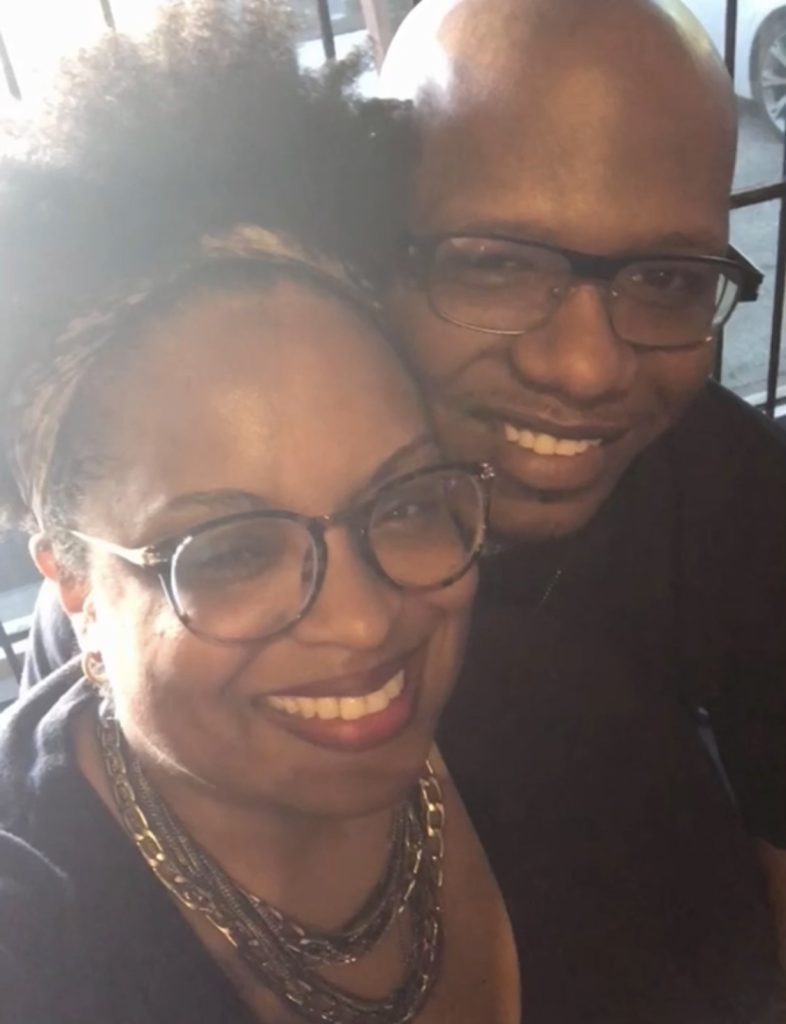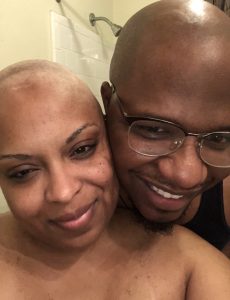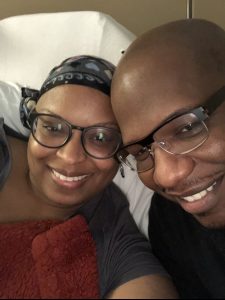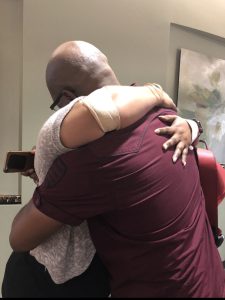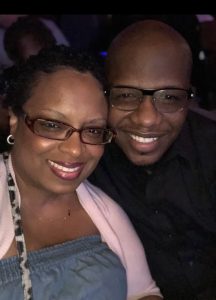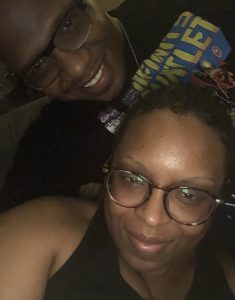Every day, millions of Americans provide essential care and medical assistance to their loved ones. These acts of love, commitment, and compassion enable their family members to receive the support they need to live a life with dignity. This has been especially true throughout the COVID-19 pandemic, during which Americans of all ages have made substantial sacrifices to keep family members safe and healthy. During National Family Caregivers Month, we recognize the important role of our Nation’s family caregivers and thank them for the invaluable and instrumental care they provide.
I was diagnosed with Breast Cancer in 2018 and I was lucky enough to have my boyfriend at the time, Jason aka Sincere529, step into the role of caregiver. Jason is among many things a podcaster and podcast producer, so doing this audio blog just felt like the perfect way to tell our story.
Despite our relationship ending, you can tell from our easy banter and our constant laughter, that we have a unique and enduring connection. I enjoyed getting his perspective on our breast cancer journey and how he feels about being called a co survivor.
Thanks Jay, for not just taking care of me but telling your side of the story. I think it’s important that co survivors know that they have a voice and if they choose, they can find the same kind of healing from talking it out and advocating that survivors often get.
Listen in to our candid convo (written transcript is at the end of this post).
“You hear these inspirational stories and you know, people talk about my mate did this, that and the third. But you know, I know I wasn’t expecting some kind of magical happy ending. I just wanted you to live, that’s all, and I was going to do whatever I could to have that happen.”
-Jason (Sincere529
“And then you know a few times, once or twice a week, just take an hour or two to yourself and just reset and come back. Because I think trying to just go full speed ahead without a break ultimately undermines the care the caretaker is supposed to be giving, you know?”
-Jason (Sincere529)
-Thanks for tuning in! Happy Caregiver/Co Survivor Month. Always, Cyn
The audio transcript is below.
[00:00:05] Intro
Cynthia: [00:00:41] We didn’t talk this through. What are we doing?
Jason: [00:00:44] Oh, OK. Well, are we intro’ing it or just going right into?
Jason: [00:00:47] Well we are recording now. So how about we do this. So how about we introduce it! Hello.
Cynthia: [00:00:54] How are you doing?
Jason: [00:00:55] Fancy seeing you here?
Jason: [00:00:58] Welcome to what, what, what? First of all, I am Jason Jamal, aka Sincere529 Who are you?
Cynthia: [00:01:04] I am Cynthia.
Jason: [00:01:05] You are Cynthia.
Cynthia: [00:01:07] I don’t have any good akas, aka Cynserity.
Jason: [00:01:10] You are an AKA.
Cynthia: [00:01:10] I am an AKA.
Jason: [00:01:18] And so we were recording this podcast on the premise and the basis of it being recognizing the survivors. They’re the caretakers of cancer survivors, correct?
Cynthia: [00:01:31] Yes, November is Caregiver Month, and I think it’s caregivers for everybody but being that I am a breast cancer survivor and you are my co survivor, we are talking about breast cancer caregiving this month and getting the perspective of my co survivor.
Jason: [00:01:47] Very cool. ust for the benefit of the audience. How long have you been a survivor? Do you want to tell a little bit about the cancer you had?
Cynthia: [00:01:52] Sure. So gosh, way back when now way back in… 2018?
Jason: [00:01:58] Yes.
Jason: [00:01:59] 2018. In March, I was diagnosed with Stage II invasive hormone-positive breast cancer.
Jason: [00:02:06] Was it March?
Cynthia: [00:02:06] Remember all that testing was right after your birthday. I think I got that. I think I got the phone call right at the beginning of March. And so it has been three years since the end of all of my active treatment. I went through surgery, a lumpectomy, chemotherapy followed by radiation, and I will be in ongoing surveillance and hormone therapy for five to 10 years. So it’s been three years since active treatment. And now I’m just seeing the doctor all too damn much. But glad to be here.
Jason: [00:02:41] I held your purse while you got all that done.
Cynthia: [00:02:42] You did.
Jason: [00:02:42] First of all, I’m glad you are here and you made it through all of that. That was a scary time.
Cynthia: [00:02:48] Thank you. It was. It was.
Jason: [00:02:50] Especially when you said that around on my birthday, when you were getting all the initial tests and everything done, it was like, Oh man, this isn’t happening again again.
Cynthia: [00:02:59] So I gave my back story. Let’s talk about your experience with cancer.
Jason: [00:03:03] Well before I was a twinkle in my father’s eye, Uh, my back story with cancer, I have seen several family members go through cancer. My mother, my father, my grandmothers and one of my sisters, and you and my sister are the only ones to come out the other side.
Cynthia: [00:03:21] Wow. Now I remember you were going to see Eric for your birthday that year, and I was going to do like your daddy and go get me a whole biopsy and come home and be like, Oh, nothing happened.
Jason: [00:03:34] I’m glad you didn’t do that because you know what else is going on at that time, I was also unemployed. During that time I got I got laid off that that previous Christmas, and in February you are you getting all your biopsy stuff done And then in March you are diagnosed. That’s a that’s already a lifetime of hard stuff right there.
Cynthia: [00:03:51] Oil and gas took a downturn,
Jason: [00:03:52] No, I was at Staples at that time.
Cynthia: [00:03:55] Oh that was Staples, right?
Jason: [00:03:56] So it might as well have been oil and gas though. It was already that we already had life happening.
Cynthia: [00:04:04] A whole lot of life happening.
Jason: [00:04:05] Then life said, hold my beer, have you considered this? And then, yeah, so where do you want to start with this now that we have intro’d it?
Cynthia: [00:04:16] So tell me you’ve already said it was a scary time. What was going through your head prior to diagnosis?
Jason: [00:04:22] Prior to diagnosis I was thinking like, if if it comes back that you do have cancer, like, you know, being that I’ve seen this many times, I need to be as much as the best caretaker I could be in that moment, you know, so anything that I thought I knew how to do then, mind you that my parents went through this I was very young. So now I’m, I just turned thirty-eight. I just turned thirty-eight and my woman has cancer. So it’s like, All right, I need to do whatever I can to make sure that you come out the other end. And you know, I’m not doing anything the doctors are doing, not even close, but I think the the at home support and the daily was going to be Important.
Jason: [00:05:01] That’s what I immediately wanted to focus on that. You know, it was, and then not even knowing like, you know, you and I talk a lot about, you know, not seeing ourselves as adults, and it’s like in that moment, it’s like we’re adults going through this real adult stuff right now, right? Like, I am literally like, I’m the man in her life, so I have to really… It wasn’t scary to be there, but it’s like, like, this is like what’s presented for me before me. You hear these inspirational stories and you know, people talk about my mate did this, that and the third. But you know, I know I wasn’t expecting some kind of magical happy ending. I just wanted you to live that’s all and was going to do whatever I could to have that happen.
Cynthia: [00:05:42] I appreciate that and you did that. I remember being terrified of telling you because you’ve been through it like, dude, how many times do you have to do this?
Jason: [00:05:54] I had to know though.
Cynthia: [00:05:54] You had to know, of course. I mean, but it was just like, Dude.
Jason: [00:05:59] Yeah, that’s it’s not something… Well, like it’s not something you expect to hear. But I mean, just given what you’re going through at the time, it’s like, OK, it’s a possibility that this is the case. If this is the case, this is what we got to do. Right. So I didn’t want to allow myself to get into any modes of doubt because you didn’t need that for me, definitely at that point in time. So it’s like, OK, whatever comes back, we’re just going to handle it. I’m going to do my part.
Cynthia: [00:06:24] And that you did. You did.
Jason: [00:06:26] I don’t know what I was doing half the time, though.
Cynthia: [00:06:29] I mean, I guess there isn’t a real way to prepare for it. I mean, I didn’t know what I was doing half the time,
Jason: [00:06:34] But I mean, it’s like, it’s different. It’s like, you know, you have the actual cancer, you’re the one that has to actually walk this walk. So it’s difficult to find out what you need to do as far as being supportive, you know, making sure that you’re eating, making sure that you’re resting. And even with that, you don’t know what’s even regulated anymore, what you can have anymore. You know, trying to communicate with your doctors to see, you know, what’s OK for you to have? What’s not? I remember doing one of your early consultations. The really eclectic doctor you had?
Cynthia: [00:07:02] The geneticist.
Jason: [00:07:03] The geneticist, yes, she pulled me aside. She’s like, Look, she’s not going to feel like being supported somedays, she’s going to be moody. But you know, you have to make sure that you know you’re OK during this process as well. So that was the my first foray into knowing that there is care needed for the caretaker.
Cynthia: [00:07:19] There absolutely is. And that’s why I think, like this month is important to not just celebrate, but to ensure that caregivers know that they need to be taken care of as well.
Jason: [00:07:28] Absolutely.
Cynthia: [00:07:28] And I think that gets lost in the fray and I can understand how, you know someone’s sick, right? You know, it’s hard to be like, but what about me? But I mean, it has to be a balance because you can only poor, you know,
Jason: [00:07:41] You can’t pour from an empty cup.
Cynthia: [00:07:41] So like, you have to still be able to take care of you. Were you able to find any of that balance during that time?
Jason: [00:07:48] I was. I think I was in my second or third year of therapy and then again, like dealing with the the job loss, trying to hustle and do like DoorDash or Uber Eats and stuff like that and and still remain you know, fixture in our daily process, because like our life has changed for us as we know it, you know, especially when you started your treatments.
Jason: [00:08:09] You know, it was a little bit of hope when they said, you might not have to do chemo. Yes, you know, because I saw my relatives go through chemo and then the radiation as well. So I’m like, when when that was off the table, I was just hoping that they caught it early enough to where you didn’t have to go through that part of it. But once that was reintroduced, I was like, OK, we’re here. We got to walk through the door. But what did I do? Therapy and just an occasional escape to kind of clear my head, but, you know, just to reset and come back because it got heavy some days.
Cynthia: [00:08:37] Absolutely it did. It did.
Jason: [00:08:40] But I wouldn’t change a thing, though, you know, I just. And then it’s weird it’s like, I wish I was working at the time, but I mean, I wouldn’t, you know, you always told me you would have been one have been working and having to take off.
Cynthia: [00:08:51] Now imagine starting a new job and I had to go to chemo when you couldn’t go with me, right?
Jason: [00:08:56] Right. That would have been that have been tough.
Cynthia: [00:08:58] Right? So I mean, as hard as it was to not be working, I think it would have been equally as hard had you been working, especially at a new job where you didn’t have the flexibility to take off like you wanted to to be there.
Jason: [00:09:11] But see like even that, the not working? That’s a major component because of you know? You know, you know how the you know, the black man, the black community and how work is so like it was that that stigma that was hanging over my head that I didn’t want to become. I guess the the rule in that case, you know, you want to be. You always want to be the exception, so you want to be a black man working and you want to make sure you support your women, want to make sure that everything is on point as far as you’re concerned. And things are just not going right, you know. It was pushing a boulder uphill with ice skates with one arm tied behind your back. It was. It was tough.
Cynthia: [00:09:44] It was. It was tough. It was tough, I can imagine. On the other end, I mean, I’ve been a caregiver of sorts and I’ve, you know, helped people through through their journeys. But being the sole caregiver, the round the clock 24 seven and having, you know, everything you feel as a man that you have to be doing, I can imagine that it was just a little bit of a chaotic period.
Jason: [00:10:10] I went to the bathroom and cried like Ray Charles did sometimes, you know. Like I said, just having seen it before, like, I mean, I was prepared for it, whether I knew it or not. I’m prepared for it. And just, well, by prepared I mean, just for from a situational standpoint, didn’t have everything I probably wanted to to give you in those moments, but I knew that I was prepared enough mentally to know like, look. Whatever effort is going to be put forth towards, you improving and getting better and, you know, persevering through this process was going to be needed. So every little bit was going to count whether I knew what I was doing or not.
Cynthia: [00:10:51] And it did count every, every single bit of it.
Jason: [00:10:55] What sticks out most to you about those moments, like I know things that stick out to me. Do you mind if I share?
Cynthia: [00:11:02] I don’t mind share away.
Jason: [00:11:03] One of the things that stuck out to me most was, I think it was after your third chemo treatment and you hadn’t lost any hair yet. So we’re sitting on the couch and you’re playing here like you’re always doing and a piece comes out in your hand and I’m like, OK, this is happening. I don’t know what to do in this situation. I do not know what to do. But it’s like, look, I’m bald, you want me to show you how we do this and we made it kind of made it fun. I think you made it fun.
Cynthia: [00:11:31] I think we did. And oh my god, hair loss was traumatic. I mean, you’ve seen me sit on the floor and cry over hair. Yeah. On a regular hair day. Hair just not acting right. Being frustrated. And I’ve cut my hair. And in fact, I had with natural prior to this and had big chopped and looked like a whole boy for a minute.
Jason: [00:11:51] You didn’t look like a boy.
Cynthia: [00:11:52] But when it started coming out, oh, I lost it for a little bit. I did. I did.
Jason: [00:11:59] I believe so, and understandably so.
Cynthia: [00:12:00] And you shaved my head and kissed my face and told me I was beautiful.
Jason: [00:12:07] Got the razor out. We buzzed you down and then you got you nice and you got a cute little head, rocking the baldie like a Dora Milaje.
Cynthia: [00:12:16] Yeah, that was a moment that really sticks out to me and um one of those pivotal moments.
Jason: [00:12:23] I think, well, like I said, being that I’ve seen you have those moments with your hair and I have a different understanding about women in their hair. Black women and their hair, especially. It’s a sign of their femininity. It’s a sign of their virtue. So for that to come out in that manner and just in the way that it did, it’s like …You’re not going to walk through this alone.
Cynthia: [00:12:45] It’s like you can almost pretend that it’s not happening a little bit. And then when you lose that hair and you’re walking around bald, it’s like shit just got real.
Jason: [00:12:53] And I was thinking, like, Dang, she got through three treatments and nothing had happened yet. It’s like, Hey, maybe she might get through this without losing her hair because they said it was a possibility, right? You might not lose your hair, so I holding hope for that. But you know, just the fact that your body is having to endure what it’s enduring to get rid of this illness that’s in you. It’s like, All right, you know, whatever happens, you need to be supported through it. You know, I remember seeing my mom go through. I didn’t get to see her go through the process of losing her hair the way you did. I came to see my mom one day and she didn’t have any hair you know, she had her hair wrapped up and then she started growing back in a similar style to how yours grew back. But, you know, it was just, didn’t know why my mom was going through this. But now I know I got to see more of, you know, lack of a better term, how the sausage is being made, you know see how it’s happening, and not only the sausage being made. I’m the butcher in there with it. But I was, I was. I was mentally prepared for it.
Cynthia: [00:13:45] I mean, what was it like having had seen your mom go through it as a child, not fully understanding or being privy to everything? Now your woman is going through it.
Jason: [00:13:56] It’s scary, but in two different ways because I didn’t, I didn’t have a real understanding at all. I was 13 when my mom went through it. So I didn’t have a really good understanding or perspective at all because as a child, you’re shielded by this from a lot of the adults, which my older sisters are shielding. My father showed me through. So to me. So it’s like now I’m the one that would be shielding if we had kids, right? Like whether regardless of who I have to shield or not, I’m the forefront on the point man on this. It’s like, OK. my woman is losing her hair, what are you going to do? It’s like it’s literally what you’re going to do. Nobody’s coming through that door. It’s like, these are the tough, pivotal moments like you said that we have to deal with. And you can make it or break it. I can. I could have shown a lack of support, and that would have been probably even more detrimental to you going through this in your journey. And it’s important to not be that, you know, again, because I can feel how I feel, but I’m still not going through what you’re going through.
Jason: [00:14:43] You know, I can I can feel everything I want, but I still don’t have the cancer. I’m still not getting the treatments, and I’m still not having to deal with the hair loss and just see my body and my life change. And and in ways that I never experienced and your life is on the line, essentially. Yeah, it’s just a better understanding of it. And just knowing like, look, you can be a supportive as you possibly can. And it’s scary because you don’t know, like, you know, you get the bullet points, but when you’re in those moments and you’re alone, you got to get creative.
Cynthia: [00:15:15] I can imagine. What is it like trying to stay partnered, romantic, attracted to someone when you’re also their caregiver?
Jason: [00:15:28] It is. It’s difficult. I will say that in those moments where stress is that high, you know. Romanticism isn’t at the forefront of things. Especially when you’re worried about how bills are going to get paid and oh yeah, my woman is going to be, you know, going through this process. But it’s still imperative that, I don’t want to use fake it till you make it, because there was nothing being faked in that moment, but it’s still you exacerbate the points that are making it. You know, the points are the things that are working with us.
Jason: [00:16:02] You just you emphasize those and you just build on that. And I think everything else will come back, you know, life is ebb and flow. It’s not going to ever be one consistent thing. You’re not going to ever be consistently blissful. You’ve got to go through different things to understand why bliss feels the way it is, right? Why agony feels the way it is. So you know, you just ride the wave and you do your best while you’re doing it, but it’s no instructions for any of this.
Cynthia: [00:16:26] There so isn’t. I’m still learning things about cancer every day. All right. You know, what do you feel about how do you make it feel being called a co survivor?
Jason: [00:16:36] I would have never thought of it in those terms. It feels weird because it still feels weird even having it being made about me, so it’s a bit of disclosure when you wrote an article. I know it was a few months back.
Cynthia: [00:16:54] Probably about a few months back.
Jason: [00:16:55] Uh-huh. And and I’m reading your perspective and the ego says she didn’t explain me, but like the reality is, it’s not about me. It’s not about me and I’ve always held that, but still human side, right? She didn’t write nothing about me. It’s not about me. You know, this is this is your moment. But like, like now this comes up when I get to tell my story. But like now, I had that one moment of ego in the grand scheme of things I would never have been thinking in those terms.
Jason: [00:17:21] But I would have felt the same way. Full disclosure. You know, we are the best of friends, but we’re not together anymore. So I don’t know how to write about you, if you want to be written about.
Jason: [00:17:33] And there’s that, you know,
Cynthia: [00:17:34] It’s you know, so it’s it’s a funny space to even really be doing this.
Jason: [00:17:38] True.
Cynthia: [00:17:38] You know, but it is our story and this is my co survivor and my amazing caretaker who rocked with me all the way and still does. So I think it was important to share this month with him and to get his perspective and to celebrate his caregiving. Not just for me. I’m just the latest, but no, it’s crazy. You’ve been through this a lot and it doesn’t seem like it. It just seems like, you know, life happens and you just go through it, right?
Jason: [00:18:07] You just go through it. But, you know, having the kitties because they had my back like, look, what are we doing today Dad? We’re doing whatever we’re going to do, but you got to feed us first, right? Get boo boo out of my litter box.
Cynthia: [00:18:23] Dude, are you tending to mommy again? What about us.
Jason: [00:18:26] We had two bad cats? But your mom was clutch because when she hired the the cleaning lady? Oh yes, clutch. I was like, Yes, I was like, Will Smith, in the Pursuit of Happiness. ..Thank you. Yeah, your mother came through.
Cynthia: [00:18:43] And those are the kind of things that I don’t think people. It’s not always having to be the caregiver. It’s it’s the little thing. Sometimes it’s the meal, it’s the cooking. It’s the, you know, my sister took me to chemo sometimes, you know, it’s just kind of all hands on deck. But even with full family support, which I had, you know again, you were my man. That’s the who’s up with me at 3:00 a.m. when I’m not feeling good.
Jason: [00:19:09] I remember we would be sitting there just on like just on regular days and after treatment especially, and we just sit on the couch and you wouldn’t be feeling good, but we’d just be sitting there. And I think, right, that was just enough in those moments. And sometimes that’s all it took. Sit there, you laying on my lap or your legs laying on me and cats over there on the other couch or something. And we were just sitting there and that a lot of times is what caregiving is. Not no flashy, you know, stuff that goes on. But, you know, once you were asleep, maybe get up, make you some dinner, do your laundry. Those are the things. That’s all I know how to do. I didn’t know what else to do in those moments,
Cynthia: [00:19:42] But that’s what I needed. You know, I think that the cuddle time has always been. It’s important, you know, that closeness, that intimacy, even when we’re not saying anything, we’re not doing anything special, but just having you close by was definitely so important to everything that I was going through.
Jason: [00:20:03] I think even with. And then that was kind of like, those are the things that didn’t need to change with us. We still needed our cuddle time. So we used to speak about attraction, all the stuff, you know. I said ebb and flow with that, but those things remain consistent, I think/ You know, you still have to feel the love coming from me and still to feel loved, you know? And I think that is important, especially with the changes your body, your body is going through in those moments. And you know, it’s just it’s just tough to remain um. Well, I won’t say its tough, but it’s I think it’s imperative to remain vigilant on the the basics, the fundamentals that go into relationships like, you know, this is why I love this person. I love spending time with this person. Right. So those things, should those basic like those, those first date moments should be the things that come to play when you’re doing those, those moments alone in a situation like that, I think, you know, if I could give any kind of expertise but like this, those moments are not what I was able to give my parents because I was a little just too young.
Jason: [00:20:57] Right. But you know, when I think back to when my dad was kind of taking care of my mom, I saw those intimate caretaking moments, but I saw them really just exist in a… Like, I’ve always loved him as my parents being together, but I saw them exist in a friend space and it was enough for both of them in that moment, you know? It definitely was enough for my mom, right?
Cynthia: [00:21:17] You know, so yeah, I’ll never forget. After surgery, we were walking up the block and you were like, I remember my dad and my mom after her surgery and just getting her up and kind of walking and getting some fresh air.
Jason: [00:21:29] You know what? I also remember, I remember after one of your treatments going to see Acrimony.
Cynthia: [00:21:32] Did we?
Jason: [00:21:32] It was after one of your treatments.
Cynthia: [00:21:35] That horrible movie.
Jason: [00:21:36] But we were both like, this movie’s bad movie is god awful, but we still had something to fall back on.
Cynthia: [00:21:43] But that’s typical us sitting up in a movie theater, enjoying ourselves and picking apart a movie afterwards.
Jason: [00:21:49] Absolutely. Absolutely. I do appreciate you asking my thoughts on this story. I appreciate you. Sorry, I couldn’t do this sooner.
Cynthia: [00:21:59] It’s all right as long as we get to do it and get to celebrate you this month. Oh yeah. Were there any tools, resources, books, apps, videos, anything that kind of help you get through your time?
Jason: [00:22:12] Like I, I was going on muscle memory, but I think my just being in therapy at the time really did wonders for me. Shout out to my therapist, Miss Jackson. She’s always giving me great exercises to do and then things to focus on whatever I’m dealing with at that point in time in life. And back then, I was going almost every week, but I think I had scaled back because I wasn’t working, but I was still going frequently enough to where, you know, OK, you know, it’s going to get me going. And then we left out the big factor. We’re both away from home. Like, you know, as far as us being in Texas.
Cynthia: [00:22:46] Well, yes and no. So we’re away from home, we are Cali folks, but my mommy and daddy are here.
Jason: [00:22:51] Yeah.
Cynthia: [00:22:51] And in fact, after this whole move my dad came home to Texas. My mom followed us here, and this was the first ever doctor’s appointment I had with both my mother and father, at least that I can recall, right?
Jason: [00:23:04] They were there. Yeah, I remember there being there for your surgery. And that was another thing about like, I know I’m an adult because everything was going through me like everybody, all information is coming through me.
Jason: [00:23:13] All the doctors are coming up to me giving me updates on you. I’m like, Damn, I really an adult in this piece. But it’s like I was again shielded from this, even though, you know, I go to do little things to take care of my dad. And like, as as I got older, I did more with my dad and even more with my sister and my grandmother. But like, I was the point man for this that’s scary, very scary because you don’t want to, you know, make a mistake, you know, make sure you’re doing everything that’s right, but then you don’t want to be the point man. And that’s where the first the bad news is going to drop. And I’m glad no bad news came to you.
Cynthia: [00:23:41] We didn’t have any more bad news.
Jason: [00:23:43] No, we did not.
Cynthia: [00:23:45] But it’s been a hell of a journey, man.
Jason: [00:23:48] I remember you ringing that bell. That was the best feeling to ring that bell. That was a great feeling. It was awesome, and I’m glad you made it through, and I’m glad you walked out the other end of it and all that pretty hair is back, right?
Cynthia: [00:24:03] It is.
Jason: [00:24:05] I kept mine like this, though. Is there anything else you’d like to ask me?
Cynthia: [00:24:12] I’m trying to think of some good questions.
Jason: [00:24:15] I was trying to prepare for this. I don’t know if I was going to be prepared enough, but you know.
Cynthia: [00:24:20] I think my most important question was, you know, like, how do you stay partnered? How do you stay boyfriend and girlfriend when you move into caretaker mode? And I guess there’s different levels of caretaking, like you didn’t have to wipe my ass? Thank the Lord.You know, but in relationships, you have to go that far.
Jason: [00:24:37] You know, I was prepared to.
Cynthia: [00:24:38] And I know you absolutely would have, and we probably would have talked shit to each other later. You know, we find a way to joke about stuff later, probably.
Jason: [00:24:46] But I woulda made it fun like, is this how babies feel after that they get a diaper change?
Cynthia: [00:24:51] You know, but it’s…
Jason: [00:24:52] Yeah, those things are important. And like I said, none of this stuff comes with instructions. But I say if you have the relationship basics. You know, I think the the basics and the fundamentals will get you through those moments where you’re missing all of the the glitz and glamour and the romanticized parts of relationships. When all those have to go on mute because life is happening and you don’t get to be, you know, frolicking through the field together and you’ve got to get down and do the dirty work. The relationship fundamentals, whether you’re married or boyfriend and girlfriend, are going to be what carry you through. You know, I think just. Yeah.
Cynthia: [00:25:28] Do you think the journey brought us closer?
Jason: [00:25:30] Absolutely. You don’t go through something like that with somebody and don’t come out the other end closer. You just, you just don’t. But it does leave an indelible, you know, mark on your life, but I have these indelible marks of people I love that have had cancer.
Cynthia: [00:25:49] Right.
Jason: [00:25:49] And I don’t know. They’ve definitely changed me each each and every time. I think this time changed me. I don’t know, I think I’m still in that change right now. It did. Like I said, so with us moving here to Texas… I only have a very, very limited amount of family here.
Cynthia: [00:26:09] Exactly.
Jason: [00:26:10] So then there’s that part. Not only am I having to be an actual adult in this moment, I don’t have what I’m familiar to fall back on. You know, I have my nephew here, but that’s it, that was the other part of it. It’s like, look, it’s the time to do it, like you got to do it. And even within the fear, it was like, there’s no there’s no shying away from this moment you got to. You got to be her man in this moment. You have to. If there’s any moment you got to be her man its at this moment right now. If any moment counts, it’s this moment, because this is literally your life hanging in the balance.
Cynthia: [00:26:50] Deep,
Jason: [00:26:52] I’m a deep, brother.
Cynthia: [00:26:56] You know, I think it’s easy like you said, the ego. Where is me? That’s why I think that term co survivor is so important.
Jason: [00:27:03] I would have never thought of it in those terms.
Cynthia: [00:27:04] Because you don’t go through it alone. We may not go through it in identical ways…
Jason: [00:27:08] Right. Right.
Cynthia: [00:27:08] But you’ve been through every step of it with me. And in fact, I had a lot of family right here who stepped up, but they don’t see it the same. They don’t see those moments where I’m crying. They don’t see those first moments when the bandages come off.
Jason: [00:27:25] Mm hmm.
Cynthia: [00:27:26] They don’t see what it’s like to get dressed months later and still not feel like yourself.
Jason: [00:27:32] What was that device that they had attached to you? That was administering the rest of your treatments afterwards, we were trying to fiddle with that thing. It came off that one time.
Cynthia: [00:27:40] I knocked it off. Oh, I can’t think of it, it was for the the bone marrow, that thing.
Jason: [00:27:44] Yeah, like all of those, those crazy moments,
Cynthia: [00:27:48] Those were crazy moments, man. You know that are those those quiet, intimate like, you got to be really close and not that I’m not close with my family, but they just don’t live in the house with me…
Jason: [00:27:58] It’s differnet in the house.
Cynthia: [00:27:58] …to always see it.
Cynthia: [00:28:00] And this that goes back to that question about how do you stay partnered and romantic? Because when you’re my person and you’ve been my person, you’re the one that I’m most vulnerable with. But it’s also like the emperor ain’t got no clothes, like you’re seeing all of those moments that aren’t the prettiest.
Jason: [00:28:17] But going back to your family, it’s important also that, you know, give them peace of mind. Like, okay, she has somebody in her corner, that’s there for her in this moment. So that leads to.. Imagine if I’m not, and then they have to worry about that. And that causes a whole lot of different friction. If they got to come in to a place where I should be doing what I’m supposed to do as your man and I’m not so now they’ve got to come in and try to intercede in these moments to where they haven’t observed you in these more vulnerable moments. As a woman, they know you, they love you, you’re their child, but they haven’t had those vulnerable, intimate moments to where they need to be there, where I’m supposed to be. So if I’m not doing that and they got to step in and intervene in that regard, that’s another problem.
Cynthia: [00:28:53] You know, and there’s two ways to do that. I can see if I had been single through the journey. Of course, that’s the kind of maybe validation I would be seeking. But in a relationship, even in those ugly moments, you want that from your partner.
Jason: [00:29:09] Absolutey.
Cynthia: [00:29:09] You know, it’s a different it’s all valid and necessary support, but you know what I mean?
Jason: [00:29:16] Different tiers of support.
Cynthia: [00:29:16] Exactly.
Jason: [00:29:16] Different tiers of support. You’re not going to get the same kind of support from, you know, your sister who loves you to death, right? Then you will from me It’s just a different type of support you’re supposed to get and that you’re going to get. And not that she wouldn’t try to give you the support that I’m slacking on, but that’s just…
Cynthia: [00:29:33] But it’s just like like rah rah rah. You’re beautiful, girl, you rocking that baldie, but when your man kisses your bald head and looks you in your face and tells you you’re beautiful, that’s different.
Jason: [00:29:44] Yeaht that’s a little bit different.
Cynthia: [00:29:44] That’s different, you know?
Jason: [00:29:47] And I meant that though, and you are, you’re rocking a cute little peanut head. Now you had to go through it and walk it and and and be this still chipper and graceful person in the midst of having cancer, going through chemo and then going through radiation.
Jason: [00:30:01] But you rocked it with me. I can’t imagine what it feels like to shave your woman’s head, while she’s crying no less. This wasn’t a new me, new hair. I just want to shave my head. This was we have to. Her hair is coming out and she’s crying.
Jason: [00:30:19] In that moment, I was like, OK, we can…So it’s a really it was a really it was a Catch 22 like, hey, you’re clearly not feeling well about your hair. When men see women, you see your woman crying you don’t want to say the wrong thing. So I am running through things to say and do. I’m like, let’s try to make it fun. So we sat a chair in the bathroom, turn the lights on and Riley is looking around the corner trying to figure out why I’m not paying him attention? But you know. Get you buzzed down and shave your head. Show you what I do with my head, I gave you a nice hot towel treatment.
Cynthia: [00:30:55] You did.
Jason: [00:30:55] Got the straight up good treatment. You had no bumps. Had you hooked up.
Cynthia: [00:31:01] You did.
Jason: [00:31:06] If you’re gonna rock the baldie, you’re going to rock the right baldie. Then you had all the nice wraps and everything, and then you was like, I don’t need these wraps. You were rocking your earrings, you was good.
Cynthia: [00:31:12] Yeah, I knew I wasn’t going to rock a wig for sure. I started with the wraps and then it was just like, Let’s get some sun on this little pale head.
Cynthia: [00:31:18] Your head was a little pale for a minute, but you had the sun on it. YOu had your earrings. You had your makeup on. You were good. You were good. You looked very feminine. You were the beautiful babies and everything was good.I remember that vividly.
Cynthia: [00:31:35] I do, too, I do too, and I’m glad, of course, we live in an era with social media and cell phones and that the journey has been well documented. You know very well.
Jason: [00:31:46] And I think, you know, for years to come, even as you continue to add to it with stuff like this, you know, people will be inspired by, you know, what you do.
Cynthia: [00:31:54] It’s kind of weird, sometimes I catch a few pictures and I’m like, I look sick. I didn’t, I don’t feel like I look sick in certain times. I see it and I’m like, I look like a cancer patient.
Jason: [00:32:04] You never looked sick to me. I just I can just tell there were were times where things were taking its toll, but she never looked like sick to me. I wasn’t going to let you get. Well, as much as I could, I just want to make sure you were fed and even those horrible days, you’re feeling like you just couldn’t do it, like I just wanted you to feel supported and, you know, you clean laundry. Make sure the cats didn’t stink. You know, I wanted to make sure everything I want. I want to make your living space as livable and stress free as possible. That was just what I felt like my job was in that moment and just do it to the best of my ability.
Cynthia: [00:32:36] Which your mom was clutch with the cleaning lady, though. I got to go back to that.
Cynthia: [00:32:40] That initial deep cleaning she did, whew.
Jason: [00:32:44] I was loving it. Yeah, I was trying to do it all.
Cynthia: [00:32:47] That’s a lot.
Jason: [00:32:48] It was a lot. It was definitely a lot. It was a lot. But I mean, I saw no other way to do it and I wasn’t going to do it any other way. So no other way to approach it, I would approach it the exact same way.
Cynthia: [00:32:59] Would you?
Jason: [00:33:00] Yep, absolutely. Without hesitation. Definitely. You know. I’m of age to get my own cancer checks and colonoscopies and stuff of that nature.
Cynthia: [00:33:17] And you better damn well be getting them.
Jason: [00:33:19] Yes, ma’am. But yeah, that stuff is scary. Even as been a caretaker so many times, you want to see yourself on the other side of it, but it’s a huge possibility.
Cynthia: [00:33:34] It is in this world, anything is possible.
Jason: [00:33:35] Anything is possible.
Cynthia: [00:33:37] So you know, I’d return the favor any day.
Jason: [00:33:41] Hope you won’t have to.
Cynthia: [00:33:44] And hopefully you won’t have to.
Jason: [00:33:45] If I have to, I will, though, you know, that’s just life. You know, you can’t you can’t predict the cause that life gives us some time. So we just got to respond the best way we can to the stuff we find ourselves in. And it’s not always easy. It’s hard. It is very hard because you want certain things, you know? You think you’re ready for certain things at certain times, and it’s, you know, it’s not. This is what life is giving you right now and you got to deal with this. Then maybe you can get to that.
Cynthia: [00:34:13] So what advice would you give to caretakers?
Jason: [00:34:18] I would advise all caretakers to get therapy throughout the process, I think that was very, very big for me, even more so than going through it before. I think the therapy angle really eliminated, whether I been through it or not before. It kind of helped me cope during the process and rejuvenate on my low days, you know?
Cynthia: [00:34:41] Right?
Jason: [00:34:41] Like, OK, I’m feeling burnt out or I’m stressed about what’s going on in life at the moment. But I got to be here for this woman and she doesn’t need to see me, you know at my emotional lows when she is trying to stay alive. You know, essentially. So I would say therapy is the biggest thing I would recommend. And then you know a few times, once or twice a week, just take an hour or two to yourself and just reset and come back. Because I think trying to just go full speed ahead without a break ultimately undermines the care the caretaker is supposed to be giving, you know.
Cynthia: [00:35:21] Right.
Jason: [00:35:21] So you can’t pour from an empty cup.
Cynthia: [00:35:23] You can’t.
Jason: [00:35:24] You can’t. And I would have been of no benefit to you if I didn’t just take those few little moments here and there to to get myself together.
Cynthia: [00:35:29] I’m glad you had the wherewithal to do that. I don’t even remember if I thought about it, then. You know, and I think um remembering, again, that your caregiver is going through it with you is important and offering them some grace um…And I think the one thing that I think we’ve been good at is talking, and so I think we talked about a lot of it while we were going through it too. It wasn’t like the elephant in the room or anything like that, but um…And of course, caregivers finding caregivers, you know, said having having my mom have the house cleaner come in, having family around to drop off a meal occasionally or to drop off soup and ginger ale like those things and everybody will alleviate the load.
Jason: [00:36:22] Such close proximity was a big, big thing. Your mom and your dad being close, your sis being being close, you know, just popping up just. But like I said, seeing you ring that bell was the best feeling ever. You know you’re back at your regular fighting weight. You know, you just had to wait for your hair to grow back. But everything was done. You were feeling good and it was like, you know, next thing you know, you got more hair than you had before. And you’re thriving.
Cynthia: [00:36:50] My eyebrows ain’t quite the same.
Jason: [00:36:51] You know, for a person who my forehead continues for forever.
Cynthia: [00:36:56] My eyebrows still aren’t quite right. But you know, hey, I got a headful of hair, though.
Jason: [00:36:59] Yeah, you have a headful of beautiful hair, curls is popping girl. All good. I do appreciate you just bringing me into this and get my perspective. I never would have even considered this.
Cynthia: [00:37:13] I think that’s what this is about. I think everybody has a voice in this journey, especially especially the main caregiver, because it is a big I want to use the word burden. It’s a big job. It’s a huge job.
Cynthia: [00:37:27] It’s not a burden. It never felt like it was a burden, but it is definitely a job that you can’t half ass it. You can’t. Because the person you’re caring for will feel that lack of support and energy.
Cynthia: [00:37:40] And I never had a moment where I where I didn’t, as much as I was scared of burdening you with it. You never made it feel like a burden.
Jason: [00:37:49] Nah I was making sure the babies was all right. Riley would agree.
Cynthia: [00:37:54] Riley was like he’s giving away all my attention.
Jason: [00:37:59] And Huey would do whatever Riley did.
Cynthia: [00:38:01] Any closing words. I’m trying to formulate my thoughts. I mean, I feel like, you know,
Jason: [00:38:07] Yeah, I know.
Jason: [00:38:08] Like, you know, but I thank you and I don’t want to cry because, you know, I will cry.
Jason: [00:38:12] Hey, come on. Go ahead, cry girl. It’s radio. We can tell you crying. But no, you know, I’m just happy you walked out to the other end of it.
Cynthia: [00:38:22] I am ever so grateful for you, as always.
Jason: [00:38:26] It was my pleasure.
Cynthia: [00:38:28] And so um I’m happy and honored to celebrate you this caregivers month. I’m about to run all of this good winged eyeliner, I got on.
Jason: [00:38:40] What if I want wings? LOL
Cynthia: [00:38:42] But I thank you for being there and for caring for me so beautifully and for taking care of yourself during that time, because that’s important as well. And I’m glad that you’re still here rocking with me through the ups and down of hormone therapy and a new body and new aches and pains. And all that comes with it,
Jason: [00:39:04] All the aches and pains that came with 40. Then we had the nerve to turn 40. No, it’s my absolute pleasure. I wouldn’t change a thing I … Probably the only thing I would change is probably just see what I put more effort in. But I’d give you my all again.
Cynthia: [00:39:20] You always give 100 percent.
Jason: [00:39:22] I would do it exactly the same way. We got about 40 minutes. That’s not bad. It’s pretty good. Anything else you want to say before we close out?
Jason: [00:39:30] I think you should really point out the the good work you’ve been doing over the last two and a half three years.
Cynthia: [00:39:34] I am honored to have been chosen to be a breast cancer baddie ambassador for For The Breast Of Us. For The Brest Of Us is the first community for women of color affected by breast cancer and we strive to make the rest of their lives after diagnosis the best of their lives. And so it has been an amazing journey advocating, creating space for and educating about breast cancer for women of color with breast cancer. Women of color die at phenomenally higher rates than white women. We are diagnosed later. Our aches and pains are ignored, and we’ve got a lot of work to do to close the gap on health disparities, and I am honored to be just a small piece of it.
Cynthia: [00:40:26] Our founders, Marissa and Jasmine, are doing some amazing, amazing things and this last year has been amazing. And while we’re at it, I went to the first ever inaugural breast cancer baddie reatreat, which you encouraged me to step out of my comfort zone and go.
Jason: [00:40:39] Very glad you did. Was that the weekend you guys did that photoshoot?
Cynthia: [00:40:42] Yes.
Jason: [00:40:42] Ok, that was an amazing photoshoot. You looked like you was getting your swag on. But can you tell people where they can find some of this information if they want to learn more?
Cynthia: [00:40:49] Absolutely, absolutely.
Cynthia: [00:40:51] So For The Breast Of Us can be found at breastofus.com and For The Breast Of Us on IG and Facebook and there is also as a Facebook group. And of course, I am on Instagram as @Cynserity and @CynsBreastLife. And Know Your Lemons, guys, feel yourself up. The more you know your body and what’s normal for you, the quicker you’ll be able to identify anything that changes because early detection can save your life. You know, it’s definitely not a guarantee, but the quicker you can get in and get evaluated and that goes for everything. So we’re filling up our boobies all the time, dudes, I know you guys play with yourselves.
Jason: [00:41:33] So check the testes.
Cynthia: [00:41:35] But be deliberate about feeling up yourself, knowing what’s where so that you can identify when something goes wrong because we are getting grown in these streets. But make no mistake, people can be diagnosed early. Yep, so no matter your age, if something is off, something doesn’t feel right, something is there that was not there yesterday. You need to know that so you can get in and you have to advocate for yourself. Don’t let someone tell you you’re too young or that’s nothing to be concerned about. Know your body so that you can be your own best advocate, and hopefully we can continue to create spaces so when you have questions and you need support or you just trying to educate yourself the best you can that you can find people that look like you and can relate to your journey.
Cynthia: [00:42:22] And so I thank you….
Jason: [00:42:25] I thank you.
Cynthia: [00:42:26] …For sharing. I think you have a very unique perspective.
Jason: [00:42:30] Is it unique? I don’t know.
Cynthia: [00:42:30] You’ve lost both your parents early on.
Cynthia: [00:42:33] Yes. Yeah, more family members and then your girlfriend turns around and gets breast cancer. And you know.
Jason: [00:42:42] I’m a comic book nerd. So they’re doing like a lot of multiverse stuff. And I’m wondering if that’s just like the the one constant point in any version of life I want to going to ever encounter. There’s always going to be a point in life or I’ll encounter or do battle with cancer on some form.
Cynthia: [00:42:56] I hope this is the last time.
Jason: [00:42:58] I hope so, too. But if not, I’ll be ready.
Cynthia: [00:43:00] You will. You’re you’re better equipped than most, unfortunately.
Jason: [00:43:02] But you know, who knows will be equipped after hearing this, though, you know.
Cynthia: [00:43:06] And that that is the entire goal. And I hope that caregivers also feel validated, also feel like they have a voice and a story to tell. And I hope that if you didn’t know it, that you know it now, this story is our story. So if you ever feel so moved, if someone asks you about the journey, you can tell any and all of it, this is your story as well. So it’s not just me who gets to be the advocate and the survivor because you’re my co survivor, babies.
Jason: [00:43:37] I got you always the babies.
Jason: [00:43:40] Well, I think I think we covered everything. What do you think?
Cynthia: [00:43:42] I think we have.
Jason: [00:43:44] Well, look, I am Sincere529. I’m kind of in between podcasts right now. But should you be able to find me everywhere on my new podcast entitled The King’s Gambit, which is kind of ironic, you know. Chess nerd moment right here. You know, in King’s Gambit, you sacrifice your very first piece for position. So, you know. I’ve had a lot of sacrifices, but the sacrifices I had early in life helped position me to be ready for what I needed to encounter later on in life.
Cynthia: [00:44:13] Bars.
Jason: [00:44:15] Ya boys a poet too.
Cynthia: [00:44:16] Yes, so Sincere529, Sincere529.com, #Sincere529, #bewareofthepoet, #bewareoftheDJ, #bewareoftheproducer too.
Cynthia: [00:44:26] You’re doing it all.
Jason: [00:44:27] I’m trying to keep up with you. You’ve got all the cool hobbies. I want some cool hobbies.
Cynthia: [00:44:32] Please you in here making whole albums.
Jason: [00:44:35] Yeah, I’m trying. But I do appreciate you having me and asking me.
Cynthia: [00:44:39] I thank you and so happy to celebrate you as my co survivor.
Jason: [00:44:44] Absolutely. The pleasure has been all mine.
Jason: [00:44:46] If there is nothing more that’ll do it.
Cynthia: [00:44:48] It will. I’ll holla at you one day soon.
Jason: [00:44:51] And as always, as I do I remind you to be good and, if you don’t be good, be good at it. Peace.


